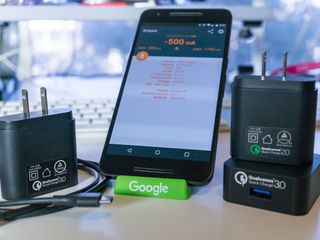Google might torpedo Qualcomm Quick Charge in future Android versions

Between Qualcomm Quick Charge, MediaTek Pump Express, Oppo VOOC, OnePlus Dash Charge, Huawei SuperCharge, Samsung Adaptive Fast Charging and Motorola Turbo Charge, fast charging methods on Android phones are kind of a mess. Some of them overlap, but not all are interoperable, and when you consider that some require not only a custom charger but a specific cable, it's a confusing situation for consumers.
And given the potential safety issues with dodgy USB-C chargers and cables, it's easy to see why Google, as a platform holder, might want to step in.
In the latest Android Compatibility Definition Document — which lays out the rules manufacturers must adhere to in order to ship Google-approved Android 7.0 devices — the company lays out some strong recommendations intended to nudge phone makers away from nonstandard USB-C charging methods like Qualcomm QuickCharge. The references, first spotted by Android Police, suggest such changes may come into force in future Android versions.
From the Android 7.0 CDD:
Type-C devices are STRONGLY RECOMMENDED to not support proprietary charging methods that modify Vbus voltage beyond default levels, or alter sink/source roles as such may result in interoperability issues with the chargers or devices that support the standard USB Power Delivery methods. While this is called out as "STRONGLY RECOMMENDED", in future Android versions we might REQUIRE all type-C devices to support full interoperability with standard type-C chargers.
The first part of that quote basically describes Qualcomm QuickCharge over USB-C, as used today on devices like the HTC 10 and LG G5. And the second part telegraphs that device makers should prepare for the hammer to be brought down in some future release.
USB Power Delivery, the standard used by Google's Pixel phones, is clearly the preferred way to bring interoperable fast charging to future Android devices. But needless to say, a hard requirement to ditch the likes of Quick Charge over USB-C is sure to ruffle a few feathers. (Qualcomm, for instance, makes money licensing the tech to manufacturers.)
AP also notes that the new docs require Android 7.0 devices with USB-C to detect both 1.5A and 3.0A chargers, including changes in how much power the charger can send. In theory, this means that standard 3A Type-C chargers should be a relatively reliable way to rapid-charge a vast majority of USB-C Android devices in future.
Be an expert in 5 minutes
Get the latest news from Android Central, your trusted companion in the world of Android
Who knows exactly when Google's "strong recommendations" against the likes of Qualcomm Quick Charge might turn into a hard requirement. It's possible this could come as soon as Android 7.1.1 (Nougat Maintenance Release 1) when that's finalized in December. More likely, we'll be looking at a longer trajectory, with such a change taking effect in Android O.

Alex was with Android Central for over a decade, producing written and video content for the site, and served as global Executive Editor from 2016 to 2022.
